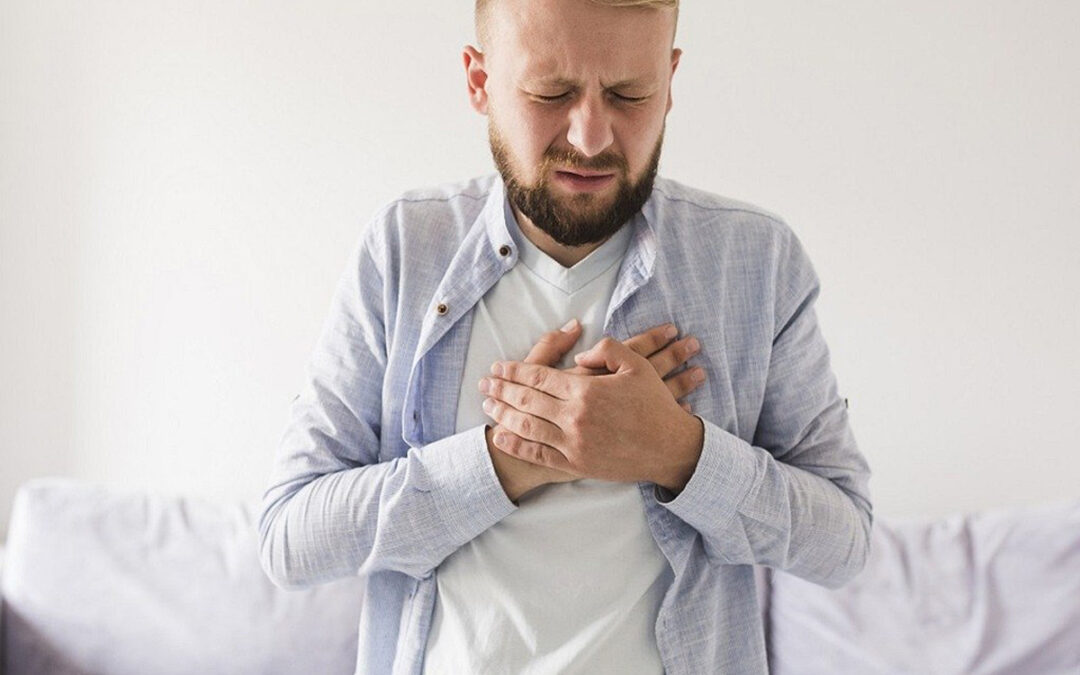GERD, or gastroesophageal reflux disease affects about 40% of American adults at least once per month. GERD is when stomach acid escapes upward into our esophagus, where there is no protective layer, and causes acid damage. GERD invites symptoms of, heartburn, regurgitation, chronic coughing, difficulty swallowing, and/or dental erosions. If left unchecked, GERD can cause constriction of the throat, scarring, ulceration, and even cancer of the esophagus.
The Problem With GERD Medications
Unfortunately, drug companies are not looking to figure out why stomach acid isn’t staying in the stomach. Instead, they assume GERD is a problem of too much stomach acid, and so have developed a line of acid-suppressing drugs, like PPI’s and H2 blockers. Like most other medications, GERD medications serve to merely suppress the symptoms of GERD even as the underlying cause of the problem continues to occur in our bodies, stripping us of optimal health and vitality.
So, It’s Not About Too Much Stomach Acid?
When we look at research, we see that the risk for developing GERD increases as we age. However, our production of stomach acid actually decreases with age. This means people statistically have low stomach acid by the time they develop GERD, so how can it be caused by too much acid?
Secondly, studies have shown that GERD patients respond very well when they supplement with HCl (hydrochloric acid, or stomach acid), which serves to increase their stomach acid.
Lastly, stomach acid is a natural production of our bodies. We need stomach acid to kill pathogens found on our food, thus protecting us from a bacterial or viral infection. Stomach acid also breaks down food and activates enzymes that digest carbs, fats, and proteins. Interestingly, our bodies also have a failsafe against stomach acid getting too high: we produce bicarbonate, a base, which neutralizes acid and ensures the correct pH in our stomach.
Now we can see the valuable purpose of stomach acid and how lowering it can harm our digestion and increase our risk for infection.
The Real Cause of Gerd:
If it’s not about too much stomach acid, then what is the real cause of GERD? Studies show that it is caused by an increase in pressure against the muscles at the end of our esophagus (where it meets our stomach). These muscles are called the lower esophageal sphincter (LES) and they are designed to prevent the contents of our stomach from traveling upwards. The only times when the LES should be open is when we are swallowing or burping.
When there is too much pressure pressing against the LES, the sphincter relaxes and opens up when it’s not supposed to. This is when GERD becomes a problem.
What Causes This Increased Pressure?
Recall the two main purposes of stomach acid: protecting our digestive system from harmful bacteria and activating enzymes that digest our food (such as carbs). Keeping this in mind, therefore:
Low stomach acid thus allows bacteria to survive through the stomach and make their way into our intestine. This can cause chronic gut infections and increase the pressure against our LES, causing the sphincter muscles to weaken and GERD to occur.
Low stomach acid also thus cannot signal enzymes to digest carbs properly. Undigested carbs are fermented by the normal gut bacteria in our intestine, and, if in excess, this fermentation generates too much hydrogen gas. Too much hydrogen gas, again, increases the pressure pressing against our LES.
How to Treat Gerd Without Medication:
The good news is that GERD can be treated and reversed without resorting to medication. This is done through replenishing low stomach acid, addressing any bacterial infections, reestablishing good bacteria in our gut, and preventing excess fermentation of carbohydrates.
–Increase your stomach acid: Supplement with one capsule of “HCl with pepsin” at the beginning of each meal. Two days later, increase to two capsules before each meal. Two days after that, increase to three capsules.
Continue increasing until you feel a slight burning sensation, then back off by one capsule. This is your “sweet spot” of how many capsules you need to take before each meal. Do not exceed 6 capsules per meal.
–Avoid NSAIDs: Ibuprefen, aspirin, and other NSAIDs can increase your risk of acid-related disorders as well as cause damage to the gut lining. Further, taking any anti-inflammatory medication concurrently with an HCl supplement, described above, can increase your risk of ulcers or gastric bleeding.
–Avoid drinking water during meals: this dilutes stomach acid and hinders digestion.
–Treat any bacterial infection or bacterial overgrowth: Low stomach acid invites bacterial infections and/or bacterial overgrowth (such as an H. pylori infection and SIBO). If you suspect this is happening, seek specific treatment, resources, and guidance with CustomCare Nutrition. Treatment will involve a specialized carb diet, antimicrobial supplements, motility agents, and sometimes antibiotics.
–Take probiotics: Probiotics are our healthy bacteria in our gut, which can become compromised due to low stomach acid. Taking probiotics can reduce bacterial overgrowth, protect against harmful bacterial strains, and normalize our digestive process.
–Eat a low-carb diet: Low stomach acid affects your ability to digest carbs properly. Decreasing the amount of carbs you eat will lessen the frequency of fermentation of undigested carbs and resulting hydrogen gas build-up. Focus on nutrient-dense, whole food rather than low-carb processed foods.
The causes of GERD are more complex than originally assumed and purported by drug companies. Furthermore, lowering our stomach acid in the hopes of suppressing symptoms will only invite a host of even more symptoms. Instead, GERD must be treated through addressing the underlying cause. This is the only way our bodies can truly heal and regain full functionality!

